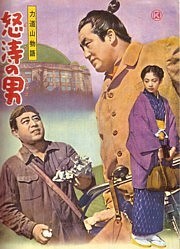Rikidōzan
Rikidōzan (力道山, real name Kim Sin-rak; 14 November 1924 – 15 December 1963) was a Korean-Japanese professional wrestler and the founder of Japan Pro Wrestling Alliance. Known as the "Father of Puroresu" (professional wrestling in Japan), he was instrumental in popularizing professional wrestling in Japan in the post-World War II era.
Early Life[edit | edit source]
Born in South Hamgyong Province in Japanese-occupied Korea, Rikidōzan moved to Japan in 1940. Initially, he aspired to be a sumo wrestler and achieved moderate success in the sport. However, facing discrimination and limited prospects for advancement due to his Korean heritage, he transitioned to professional wrestling.
Professional Wrestling Career[edit | edit source]
Rikidōzan's professional wrestling career began in the early 1950s. He quickly became a national hero in Japan, symbolizing the country's recovery and resilience in the aftermath of World War II. His matches, especially those against American wrestlers, were highly publicized and drew massive audiences, both live and on television.
One of his most famous rivalries was with Lou Thesz, an American professional wrestler. Their matches were some of the most watched television broadcasts in Japan at the time. Rikidōzan also faced other notable wrestlers such as The Destroyer and Freddie Blassie, further cementing his status as a legend in the sport.
Legacy[edit | edit source]
Rikidōzan's impact on professional wrestling in Japan cannot be overstated. He is credited with laying the foundation for Puroresu, which has since become a significant aspect of Japanese popular culture. His training of future wrestling stars like Giant Baba and Antonio Inoki ensured the growth and sustainability of professional wrestling in Japan.
Rikidōzan's life was not without controversy, including rumored ties to the Yakuza. His sudden death in 1963, from complications arising from a stabbing incident in a Tokyo nightclub, shocked the nation and the wrestling world.
Death and Posthumous Recognition[edit | edit source]
Rikidōzan died on 15 December 1963, at the age of 39. His death was mourned by millions of fans, and he was posthumously recognized for his contributions to professional wrestling. He has been inducted into several wrestling halls of fame, including the WWE Hall of Fame.
In Popular Culture[edit | edit source]
Rikidōzan's life and career have been the subject of numerous books, films, and documentaries in Japan and internationally. His story is seen as a symbol of post-war recovery and the bridging of cultural divides through sports.
See Also[edit | edit source]
Search WikiMD
Ad.Tired of being Overweight? Try W8MD's physician weight loss program.
Semaglutide (Ozempic / Wegovy and Tirzepatide (Mounjaro / Zepbound) available.
Advertise on WikiMD
|
WikiMD's Wellness Encyclopedia |
| Let Food Be Thy Medicine Medicine Thy Food - Hippocrates |
Translate this page: - East Asian
中文,
日本,
한국어,
South Asian
हिन्दी,
தமிழ்,
తెలుగు,
Urdu,
ಕನ್ನಡ,
Southeast Asian
Indonesian,
Vietnamese,
Thai,
မြန်မာဘာသာ,
বাংলা
European
español,
Deutsch,
français,
Greek,
português do Brasil,
polski,
română,
русский,
Nederlands,
norsk,
svenska,
suomi,
Italian
Middle Eastern & African
عربى,
Turkish,
Persian,
Hebrew,
Afrikaans,
isiZulu,
Kiswahili,
Other
Bulgarian,
Hungarian,
Czech,
Swedish,
മലയാളം,
मराठी,
ਪੰਜਾਬੀ,
ગુજરાતી,
Portuguese,
Ukrainian
Medical Disclaimer: WikiMD is not a substitute for professional medical advice. The information on WikiMD is provided as an information resource only, may be incorrect, outdated or misleading, and is not to be used or relied on for any diagnostic or treatment purposes. Please consult your health care provider before making any healthcare decisions or for guidance about a specific medical condition. WikiMD expressly disclaims responsibility, and shall have no liability, for any damages, loss, injury, or liability whatsoever suffered as a result of your reliance on the information contained in this site. By visiting this site you agree to the foregoing terms and conditions, which may from time to time be changed or supplemented by WikiMD. If you do not agree to the foregoing terms and conditions, you should not enter or use this site. See full disclaimer.
Credits:Most images are courtesy of Wikimedia commons, and templates, categories Wikipedia, licensed under CC BY SA or similar.
Contributors: Prab R. Tumpati, MD





